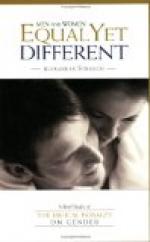Though plurality of wives was customary both before and after the giving of the Law, it was by no means ordained by it. A man had no more right, in carrying out the designs of the Almighty, to have two or more wives living at the same time, than a woman had to have two or more husbands living at the same time. Wherever the Bible speaks of the duty of husbands to wives, or of wives to husbands, the singular form is invariably used, as husband and wife. For instance, when God brought the woman he had made to Adam, he (Adam) says: “Therefore shall a man leave his father and his mother, and shall cleave to his wife”—not wives—“and they shall be one flesh.” And again, “They twain shall be one flesh.” What God has directly commanded, and what he merely suffers men to do without imposing insuperable restraints upon them, are two very different things.
It is asserted that the Mosaic Law makes a very great and decidedly partial distinction between men-servants and maid-servants, greatly to the disadvantage of the latter, particularly in their release from servitude. These same texts—some of them, at least—have been quoted in defense of African slavery. The term, selling a Jewish servant, in the Scripture, is simply the same as binding out a child under English law. A Jewish father could only “sell,” or in other words bind out, his daughter for six years, and that before she was of a suitable age to be married.[J] At the expiration of six years her apprenticeship ceased, and the maid-servant was free, unless she voluntarily perpetuated her own servitude.




